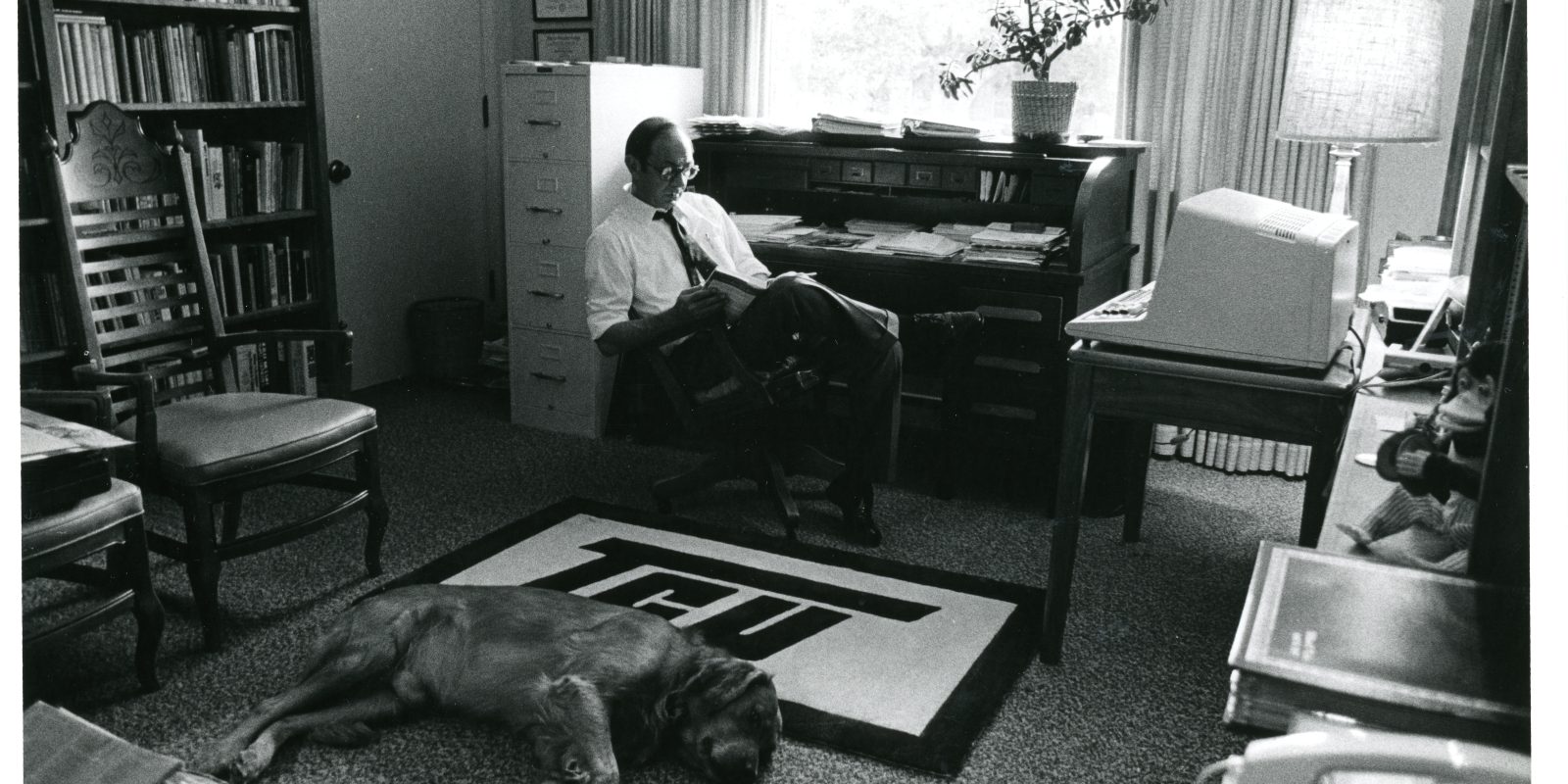
A Servant Leader
Chancellor William Tucker’s careful eye toward the future prepared TCU for its transformation into a top national university.
William Edward Tucker ’56 BDiv, who served as TCU’s chancellor from 1979 until 1998, died Oct. 14. He was 90.
Born in Charlotte, North Carolina, Tucker devoted his life to the Christian Church (Disciples of Christ) and, eventually, Texas Christian University.
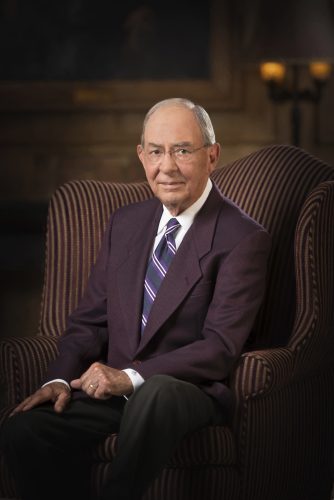
William Edward Tucker was born in Charlotte, North Carolina, at the Crittendon Home for Unwed Mothers and named Stanley Perry. When he was about a year old, he was adopted by Ethel and Cecil Tucker. An ordained Disciples of Christ minister, he became TCU’s eighth chancellor. (Photo courtesy of the Tucker family)
“I think TCU was always part of my dad’s destiny,” said daughter Jan Tucker Scully ’79 (MBA ’81).
Tucker first learned of TCU during his undergraduate days at Atlantic Christian College — later renamed Barton College — in Wilson, North Carolina. Then TCU Chancellor M.E. Sadler had graduated from Atlantic Christian, and Tucker, who earned a bachelor’s degree in English, religion and history, studied there while James Mattox Moudy ’43 (BDiv ’49), who became TCU’s seventh chancellor, was dean.
Tucker came to Fort Worth to pursue a degree from Brite Divinity School because he had planned to become a working minister. “I came to Fort Worth never having been west of the Mississippi River,” he told Michael Gutierrez, who was working on behalf of the TCU Oral History Project, in 2011.
While at Brite, Tucker fell in love with a TCU undergraduate from Albany, Texas, his future wife, Jean Jones Tucker ’56.
“Jean’s understanding of life has enabled me to derive all sorts of counsel,” Tucker told TCU Magazine in 1998. “She is more accepting of people on the earth, no matter their station in life or point of view, than anyone I have ever known.”
After 1956, when he became an ordained Disciples minister, he switched his life goals from ministry to service in higher education. He left Texas to pursue a master’s and then a PhD in church history at Yale University and graduated with honors. He returned regularly to visit Fort Worth. After he discovered it, he said, “I never really left TCU.”
Early in his academic career, he came back to Brite and worked his way from professor to dean. During that time, he and Lester McAllister co-wrote the seminal history of the Disciples Church, Journey in Faith.
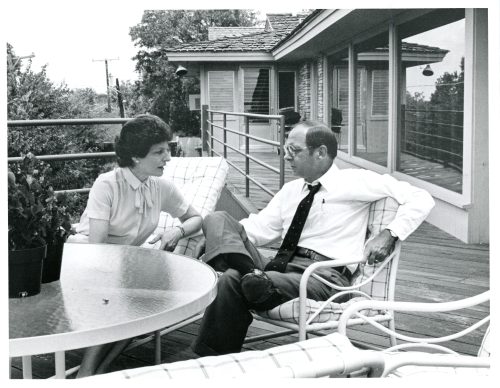
Bill and Jean Jones Tucker ’56 married in 1955. “I believe my mother was the source of my Dad’s strength,” said daughter Jan Tucker Scully ’79 (MBA ’81). Photo courtesy TCU Special Collections
“He was a seeker, a great intellect with an inquisitive mind,” granddaughter Kate Scully Wells ’08 wrote in a tribute.
Another Disciples-affiliated school, Bethany College in West Virginia, lured Tucker away from Brite by making him president. He served Bethany in that role from 1976 to ’79.
Back in Fort Worth, Moudy was experiencing failing eyesight. The executive committee of the TCU Board of Trustees unanimously recommended the 47-year-old Tucker to be his replacement.
Tucker embraced the appointment as TCU’s eighth chancellor, telling the Bayard H. Friedman-led board: “I accept with enthusiasm, without reservation and with sincere gratitude for their expression of confidence in me. It is a privilege to return to this university.”
Righting the Ship
When Tucker assumed the TCU chancellor’s role in fall 1979, “Higher education in America was at a time of low tide,” he told Gutierrez. “It was especially low tide at TCU.”
The mood in Fort Worth was “gloomy,” he said. Enrollment had dropped to 5,930 students, and the university was losing money. He made the tough initial decision to scuttle some faculty positions; the remaining professors were earning salaries in the bottom quartile for the industry.
An adherence to fiscal conservatism would mark Tucker’s tenure at the helm of TCU. He became known around campus, and in higher education circles, for his saying: “A university that is not fiscally sound cannot remain academically strong for long.”
As the 1980s took hold, Tucker focused on balancing TCU’s budget and raising funds to secure the university’s future.
“He never spent a penny on our office,” said Mary Nell Kirk, who served as Tucker’s administrative assistant for his final eight years as chancellor. “Every penny went to the endowment.”
TCU at the time derived more income from oil and gas than any other private school in the country, and Tucker found the petroleum industry’s volatility dangerous for the long-term financial stability he envisioned. He decided to cap the percentage of income the university could reap from oil and gas. “That was a major decision at a time when TCU was not flush with money,” he told the TCU Oral History Project.
In 1979, the combined endowment for TCU and Brite was $52 million, a figure too small to ensure the university’s long-term success. Tucker made a silent personal vow to raise an additional $52 million during every two years of his leadership. “I knew the endowment needed to grow — and grow significantly — if TCU were to ever fulfill its mission to become what it is today.”
The Next Frontier fundraising campaign, which he led alongside Provost William Koehler, aimed for a $100 million goal. The effort was slated to kick off in the 1980s, but the timing was terrible, Tucker said. “That’s when so many banks failed — the price of oil fell — it was a serious recession.”
They postponed the campaign kickoff until 1990. By 1997, the campaign had exceeded its $100 million goal, and faculty were earning salaries akin to high-ranked national universities.
By Tucker’s retirement in 1998, TCU’s endowment had reached $750 million — meaning he had far exceeded his secret fundraising goal.
Eyes to the Future
New buildings constructed during Tucker’s tenure could rise only if their maintenance would be provided for in perpetuity. The Dee J. Kelly Alumni & Visitors Center, the Mary D. and F. Howard Walsh Center for Performing Arts, W.A. Moncrief & W.A. “Tex” Moncrief Jr. Hall, the Winthrop Rockefeller Building for Ranch Management and new athletics training facilities popped up during those two decades. He also doubled the size of the Mary Couts Burnett Library and added a nursery to the physical plant so the campus would be permanently blanketed with fresh flowers.
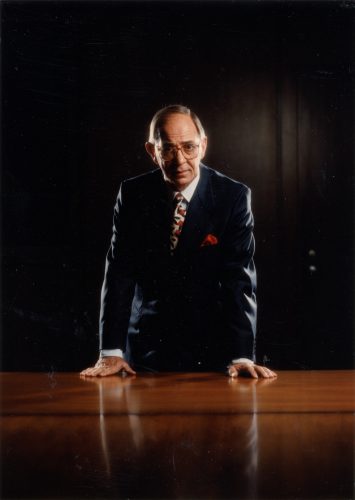
Though reluctant to spend money from TCU’s endowment, Bill Tucker, along with wife Jean, were generous to the university with their time and funds. The couple purchased, among other things, the famous statues of TCU founders Addison and Randolph Clark and the university seal embedded in the ground in front of Sadler Hall. (Courtesy of TCU Special Collections)
By 1985, after a successful football season highlighted by an appearance in the Bluebonnet Bowl, TCU’s admissions woes had ceased. Koehler suggested TCU cap freshman admissions — a move that would have been unimaginable to the struggling university of 1979. The dormitories were so crowded that the facilities could not accommodate all of the incoming students. Bill and Jean Tucker invited some students to stay at their home while they looked for a place to live.
Enrollment was at 7,273 by the end of the Tucker years — a growth of 23 percent.
With Tucker serving simultaneously as chancellor and moderator for the North American Christian Church (Disciples of Christ) — he had a separate Sadler Hall office for each role — TCU’s academic ambitions grew as well.
He launched an undergraduate program in engineering, which is now housed in the William E. and Jean Jones Tucker Technology Center. He grew doctoral enrollment in arts and sciences and wired the entire campus for the advent of the internet age.
He kept his head down for the duration of his leadership, Kirk said. “He would help students move in, and they would say, ‘Who are you?’ ‘I’m Bill Tucker; I work for the university.’ And then later on, they would find out that, oh, he’s the chancellor.”
Victor J. Boschini, Jr., TCU’s current chancellor, concurred: “Of the many things I admired and liked about Chancellor Tucker, the one I most appreciated was that he was such — what I would call — a secure leader. He did not need to be out in the spotlight. He did not always need to be the smartest guy in the room. He was more than happy to learn along with you in any given situation or circumstance.”
Tucker retired in 1998, having set the intentional course for a more ethnically and racially diverse, academically ambitious and wealthy university. Because of his diligence and foresight, the TCU of today little resembles the struggling regional college he assumed leadership of in 1979.
“In the dark of the evening when he finally felt comfortable leaving TCU’s campus,” said his son Vance Tucker, “he still found time to be a great husband and father, worthy opponent on the tennis court and a legendary force on the basketball court, with the sharpest, most dangerous knees known to mankind.”
In retirement, Tucker stayed connected to the university. “He was always there to help and guide me whenever I called him,” Boschini said. “He never made me feel as if my problems or concerns were unimportant or trivial … even when they were. He was the one person who I knew would always have a 100 percent appreciation of exactly where I was coming from on every issue.”
Tucker’s gentle guiding presence was not reserved for those in high-pressure leadership positions, his granddaughter Amanda Scully Peterson ’11 wrote in a memorial post: “He made everyone he met feel like the most important person in the world during that moment.”
Today’s TCU enrollment stands at 12,273 students, and the endowment Tucker labored over has reached $2.4 billion. Upon his retirement, Tucker refused to take credit for the university’s steady growth under his leadership. He told TCU Magazine: “I hope the word I use most often … is thanks. Bill Tucker may be getting a pat on the back, but I am merely representing a community that has succeeded. TCU is something that everyone should own, and claim, and celebrate.”
William Tucker is survived by his beloved wife, Jean; daughter Jan Tucker Scully, a longtime TCU Trustee; sons Will Tucker and Vance Tucker; several grandchildren and great-grandchildren; and by many thousands in the global Horned Frog community who are thankful for his enduring love for and service to TCU.
Please consider making a gift to the William E. Tucker Endowed Scholarship in honor of his legacy.
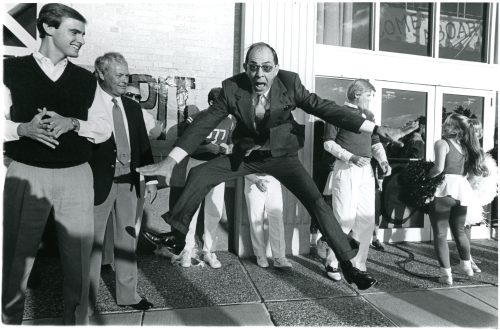
Though Bill Tucker was famous for working until midnight, seven days a week, he knew how to let loose and have fun. Granddaughter Amanda Scully Peterson ’11 wrote in tribute about his “quick wit, the dry humor, the incredibly long pauses. The humor where you didn’t quite know he was joking until he began to laugh.” (Courtesy TCU Special Collections)

Your comments are welcome
10 Comments
It’s too bad I never met him, but I knew one of his closest friends and I know the joy of reunion that’s taking place. #leadonTCU
Chancellor Tucker handed me my B.S. in May 1988 and my M.Div. in May 1994.
Occasionally through my years on campus, I would cross paths with Chancellor Tucker. He would always smile and speak to me as if he knew me personally. Then there was that one summer afternoon when I wanted to run into the post office in the Saddler Hall basement to quickly check my mail a little before 1:00.
Then as now, as I understand it, campus parking was a challenge even in summer school. The only empty spot I could find that wasn’t across the street in the stadium parking lot was his, right next to the door. If I had just parked, gone in, and checked my mail when I first got there, I wouldn’t even remember the event. But I thought about it. I did another lap around Frog Fountain looking for a less valuable spot. Finding none, I gave up and went back to the Chancellor’s reserved parking reasoning that an important man like him would probably have taken a long lunch anyway.
Chancellor Tucker drove up behind me as I was pulling in and, to this day, I’m grateful he allowed me to drive away without a ticket.
Mr. Tucker as he was known to those of us that grew up with his daughter was the best, very approachable and always open to discussions. Above all else he was the ultimate gentleman to all individuals, no matter where they originated from. I normally reserve the following for fellow law enforcement personnel but it applies to Mr. Tucker:
William Tucker was called
William Tucker served
WILLIAM TUCKER IS COUNTED!
My heart bleed for Jan who I have known for in excess of 55 years and the entire Tucker family and TCU for the loss of Mr. Tucker.
We have lost a giant.
Will always appreciate Dr. Tucker’s kindness in helping me out with getting air from Robert Carr chapel. Had a jar with the bride and groom from our wedding cake in it. Went to the chapel on the weekend but found the doors locked. Dr. Tucker was dean of Brite and was next door working. He was so nice to let me in the chapel where I was married to get some air for the jar.
Back in June 1993, on my third day working at TCU, I was over in the hallway of a very quiet Sadler “basement” when I noticed a young man and his mom trying to find their way around. I saw this gentleman, in a white shirt and loose tie with the sleeves rolled up holding some papers, come down the stairway. He walked over to them and asked if they needed help and they explained they were trying to find a room number. I remember to this day him smiling and saying how he could help them – he was pretty familiar with where things were. Then he walked down the hallway with them. Someone passing me laughed and said to me, “He should, he’s the chancellor.” I remember thinking how glad I was to be working here with such a quietly awesome dedicated leader. Thank you sir and thank you to your family who shared you with us.
Dr. Tucker did indeed turn things around at TCU. His arrival on campus was palpable, and the changes made remarkable. He was always pleasant, the faculty talked highly of him and he was often visible around campus. He brought a feeling of pride back to TCU while raising the standards of the university. Where previously no one outside of the SWC knew of TCU, I think the whole world is aware now. I’m proud to have received my two diplomas from Dr. Tucker and TCU. We cannot thank him enough!
I remember when I was at TCU in 1990 or 91 we were outside our dorm late at night because the fire alarm sounded. Chancellor Tucker walked up and stayed with us in the parking lot until we could return to our dorm. He was so kind and friendly!
I was just a small child of a student who was attending TCU in the 80s. I meet Mr. Tucker after I found an actual “horned toad” while playing in the yard at home. I did not want the tiny hatching to get squished and convinced my parents to make a home for it. After a couple days of researching how to care for it my parents realized that this lizard only eats live food, and my parents not wanting to build an ant farm to feed the little lizard had a problem. Mr. Tucker had his own setup of Horned Toads in his office and I was able to take my tiny little friend to its new home. I remember him being as excited as I was and joyfully showed me his current adult lizards. I still have the small note he sent to us welcoming us back to come visit the little friend I found. We moved back to california a couple years later. But i still remember that interaction and have the note still.
RIP! From Tommy Flores and Family.
Related reading:
Features
A man on a mission
Former chancellor Michael R. Ferrari oversaw Commission on The Future of TCU, helped author the university mission statement and got school ready for the 21st century.